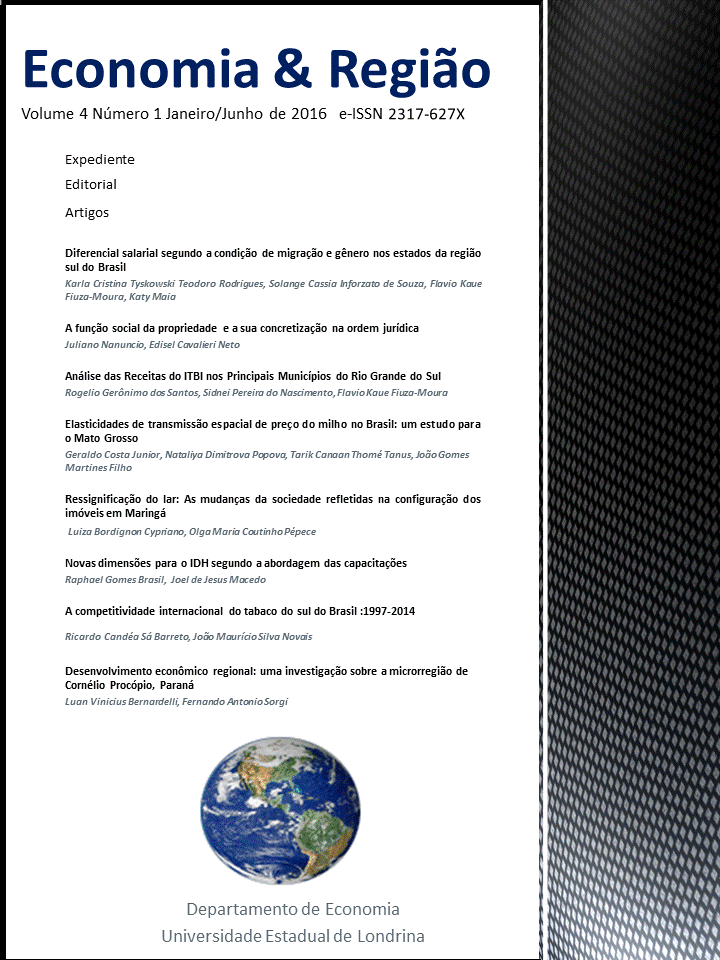New dimensions for HDI according to the capability approach
DOI:
https://doi.org/10.5433/2317-627X.2016v4n1p103Keywords:
Tolerance, Criminality, Democracy, HDI, Capability ApproachAbstract
The concept of human development has evolved over the years, from a simple measure of per capita income to more sophisticated definitions, such as the capability approach by Amartya Sen, which is related not only to what people have, but also to a range of capabilities that allow people to choose what they want to be or do. In this sense, the concept of development must be expanded, allowing the Human Development Index (HDI) to cover dimensions related to individual freedoms. In this paper, we suggest a new HDI methodology, adding measures of tolerance, crime and democracy in its calculation. The results allow us to conclude that even societies with a high standard of living face problems such as racism and lack of political freedoms.Downloads
References
ALKIRE, S.; SANTOS, M. E. Multidimensional poverty index. Oxford: OPHI, 2010.
ALESINA, A.; RODRIK, D. Distributive politics and economic growth. Quarterly Journal of Economics, Oxford, v. 109, n. 2, p. 465-490, 1994.
BARRO, R. J. Democracy and growth. Journal of Economic Growth, Boston, v. 1, n. 1, p. 1-27, 1996.
BASU, R. L. Why the Human Development Index does not measure up to ancient Indian standards? Culture Mandala: The Bulletin of the Centre for East-West Cultural and Economic Studies, Robina, v. 6, n. 2, p. 1-7, 2005.
BASUCHOUDHARY, A.; SHUGHART, W. F. On ethnic conflict and the origins of transnational terrorism. Defence and Peace Economics, Oxfordshire v. 21, n. 1, p. 65-87, 2010.
BECKER, K. L. Uma análise do efeito dos gastos públicos em educação sobre a criminalidade no Brasil. Brasília: ESAF, 2013.
BOMFIM, M. P. M. A Capability Approach de Amartya Sen e o indicador de desenvolvimento humano (IDH). 2012. Dissertação (Mestrado em Economia Política) – Pontifícia Universidade Católica de São Paulo, São Paulo. 2012.
CAPASSO, S. Crime, inequality and economic growth. In: SALVADORI, N.; BALDUCCI, R. (ed.). Innovation, unemployment, and policy in the theories of growth and distribution. Cheltenham: Edward Elgar, 2005. p. 168-187.
CASADIO, T. E.; PALAZZI, P. Un indice per lo sviluppo sostenibile. PSL Quarterly Review, Roma, v. 57, n. 229, p. 123-149, abr. 2012.
DAS, J.; DIRIENZO, C.; TIEMANN, T. A global tolerance index. Competitiveness Review: An International Business Journal, Bradford, v. 18, n. 3, p. 192-205, 2008.
EASTERLY, W.; LEVINE, R. Africa’s growth tragedy: policies and ethnic divisions. The Quarterly Journal of Economics, Oxford, v.112, n.4, p. 1203-1250, 1997.
EASTERLY, W.; RITZEN, J.; WOOLCOCK, M. Social cohesion, institutions, and growth. Economics and Politics, Malden, n. 18, p. 103-20, 2006.
EVIDGE, C. D. et al. The Night Light Development Index (NLDI): a spatially explicit measure of human development from satellite data. Social Geography, Colorado, v. 7, n. 1, p. 23-35, 2012.
KLEINSCHMITT, S. C.; LIMA, J. F. de; WADI, Y. M. Relação entre o crescimento da desigualdade social e dos homicídios no Brasil: o que demonstram os indicadores? Interseções: Revista de Estudos Interdisciplinares, Rio de Janeiro, v. 13, n. 1, p. 65-90, 2012.
KUMAR, S. Crime and economic growth: Evidence from India. 2013. MPRA Paper No. 48794. Disponível em: http://mpra.ub.uni-muenchen.de/48794/. Acesso em: 17 abr. 2016.
LLOYD-ELLIS, H.; MARCEAU, N. Endogenous insecurity and economic development. Journal of Development Economics, College Park, v. 72, n. 1, p. 1-29, 2003.
MARTINS, A. R. P.; FERRAZ, F. T.; COSTA, M. da. Sustentabilidade ambiental como nova dimensão do Índice de Desenvolvimento Humano dos países. Revista do BNDES, Rio de Janeiro, v. 13, n. 26, p. 139-162, dez. 2006.
MAURO, P. Corruption and growth. The Quarterly Journal of Economics, Oxford, v. 110, n. 3, p. 681-712, 1995.
MONTALVO, J. G.; REYNAL-QUEROL, M. Ethnic polarization, potential conflict, and civil wars. American economic review, Cambridge, v. 95, n. 3, p. 796-816, 2005.
NOYOO, N. Ethnicity and development in sub-Saharan Africa. Journal of Social Development in Africa, Harare, v. 15, n. 2, p. 55-68, 2000.
OJOG, D. The effect of crime on economic growth. Departamento de Economia, Erasmus University Rotterdam, Roterdã, 2014. Disponível em: https://mail.google.com/mail/u/0/#inbox/154255e41ec31b28?projector=1. Acesso em: 17 abr. 2016.
OLIVEIRA, W. F. de. Índice de Desenvolvimento Humano e Pegada Ecológica: Uma proposta de integração. In: ENCONTRO REGIONAL DE ECONOMIA DA REGIÃO SUL, 16., Porto Alegre, 2013. Anais... Porto Alegre: ANPEC Sul, 2013.
PALAZZI, P.; LAURI, A. The Human Development Index: suggested corrections. PSL Quarterly Review, Roma, v. 51, n. 205, p.193-201, 2013.
PEÑAFLOR, P. E. C. Intangible assets and the search for a new development paradigm: redefining concepts of wealth, poverty and development. Center for Conscious Living Foundation, Feb. 2011. Disponível em: https://mail.google.com/mail/u/0/#inbox/154255e41ec31b28?projector=1. Acesso em: 17 abr. 2016.
PERSSON, T; TABELLINI, G. Is inequality harmful for growth? The American Economic Review, Cambridge, v. 84, n. 3, p. 600-621, 1994
POWELL, B.; MANISH, G. P.; NAIR, M. Corruption, crime and economic growth. In: BENSON, B. L.; ZIMMERMAN, P. R. (ed.). Handbook on the Economics of Crime. Cheltenham: Edward Elgar, 2010. p. 328-341.
SAGAR, A. D.; NAJAM, A. The Human Development Index: a critical review. Ecological Economics, Cambridge, v. 25, n. 3, p. 249-264, 1998.
SARTORI, G. Democracy. In: INTERNATIONAL Encyclopedia of Social Sciences. London; New York: Macmillan, 1968. v. 4, p. 112–121.
SEN, A. Desenvolvimento como liberdade. São Paulo: Companhia das Letras, 2000.
SEN, A. The idea of justice. Cambridge (MA): Harvard University Press, 2009.
SOARES, R. R. Development, crime and punishment: accounting for the international differences in crime rates. Journal of Development Economics, College Park, v. 73, n. 1, p. 155-184, 2004.
STEWART, F. The Elgar companion to development studies. Cheltenham: Edward Elgar, 2006.
TANER, M.; SEZEN, B.; MIHCI, H. An alternative Human Development Index considering unemployment. South East European Journal of Economics and Business, Sarajevo, v. 6, n. 1, p. 45-60, 2011.
THORBECKE, E. The evolution of the development doctrine, 1950-2005. Helsinki: UNU-WIDER, 2006. Research Paper No. 2006/155.
UNDP. United Nations Development Programme. Human Development Report 1990: Concept and measurement of human development. New York: Oxford University Press, 1990.
UNDP. United Nations Development Programme. Human Development Report 2010: A verdadeira riqueza das nações: vias para o desenvolvimento humano. New York: Oxford University Press, 2010.
WVS. World Values Survey. Official Data File. Madrid: ASEP/JDS, 2006. v. 5.
Downloads
Published
How to Cite
Issue
Section
License
Economia & Região adota a Licença Creative Commons Attribution CC-BY 4.0 International, portanto, os direitos autorais relativos aos artigos publicados são do(s) autor(es), que cedem à Revista Economia & Região o direito de exclusividade de primeira publicação.
Sob essa licença é possível: Compartilhar - copiar e redistribuir o material em qualquer suporte ou formato. Adaptar - remixar, transformar, e criar a partir do material, atribuindo o devido crédito e prover um link para a licença e indicar se mudanças foram feitas.














